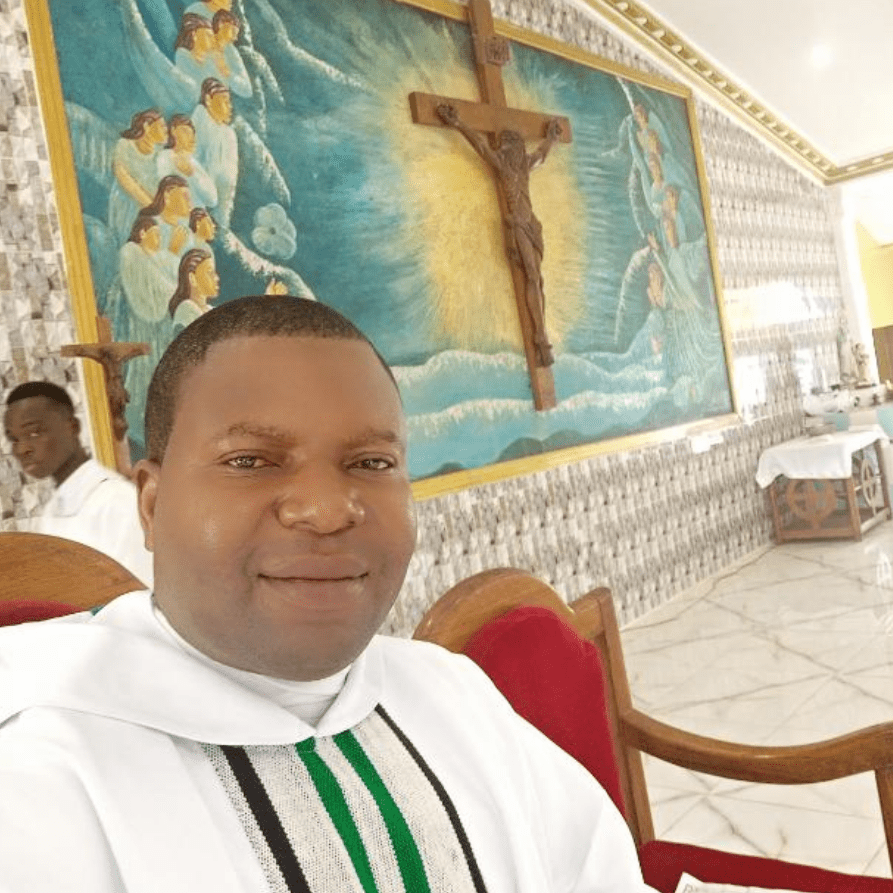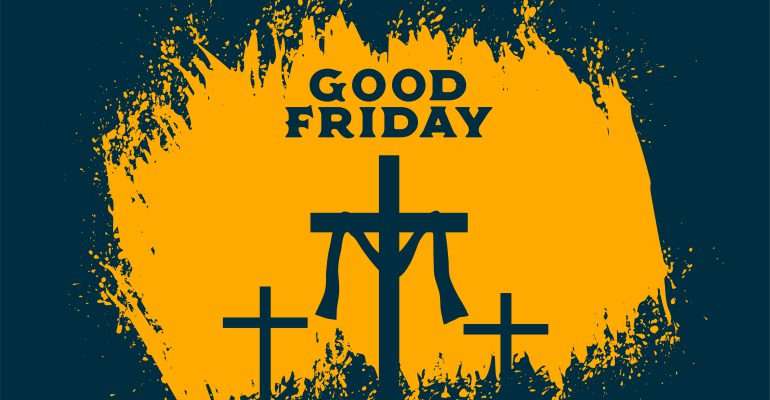Readings: Isaiah 52: 13-53:12; Psalm 30: 2,6,12-13, 15-17, 25; Hebrews 4:14-16; 5:7-9; John 18:1-19:42

As Jesus hung on the cross, he uttered seven last phrases of great meaning to those contemplating his passion and death, today, on Good Friday reflection is offered by Fr. Tersoo Gwaza, S.J.
“NO CROSS, NO CROWN.”
The expression “No Cross, No Crown” has been broadly used and among the primary users were William Penn “NO CROSS, NO CROWN” published in London in 1669.
The question is, how do we get the crown in our global, secularized and changing world in the twenty–first century? I think the answer would be found in today’s celebration, which is Good Friday, the sacrificial love that entails dying for each other. Also, from the instructions of Jesus on discipleship and its challenges in the twenty-first century. But then, who is a disciple?
According to Harper Collins Bible Dictionary, a “disciple is (translates the Greek word μαθητής (mathētēs). For ‘learner’) an apprentice or pupil attached to a teacher or movement; one whose allegiance is to the instruction and commitments of the teacher or movement.” In addition, “most New Testament (NT) reference to ‘disciple’ designate ‘followers’ of Jesus, often a large group including both his closest associates (the Twelve) and a large number who followed with varying positive responses” (Luke 6:17). In the expression of Paul J. Achtemeire: “Discipleship means losing to win.” Moreover, “And everyone who has given up houses or brothers or sisters or father or mother or children or lands for the sake of my name will receive a hundred times more, and will inherit eternal life” (Mat 19:29). Having attempted to define disciple/discipleship, I will now outline the general instructions given to the disciples by Jesus in the tradition of Mark, which is still applicable to all Christians who are the disciples of Jesus today.
First Instruction to Discipleship (Mark 8:34-9:1)
He summoned the crowd with his disciples and said to them, “Whoever wishes to come after me must deny himself, take up his cross, and follow me. For whoever wishes to save his life will lose it, but whoever loses his life for my sake and that of the gospel will save it. What profit is there for one to gain the whole world and forfeit his life? What could one give in exchange for his life? Whoever is ashamed of me and of my words in this faithless and sinful generation, the Son of Man will be ashamed of when he comes in his Father’s glory with the holy angels.” He also said to them, “Amen, I say to you, there are some standing here who will not taste death until they see that the kingdom of God has come in power” (Mark 8:34-9:1). Having outlined clearly the instructions of Jesus to his disciples, I will now attempt to analyze/interpret the instructions according to each verse.
Deny himself, take up his cross, and follow me. [Mk 8:34; Mat 10:38; 16:24; Lk 14:26-27]
According to John Paul Heil, to deny oneself implies an “act in total selfless manner without concern for personal advantage or convenience but open to ‘the things of God’… in favor of the divine necessity of his suffering and death.” In addition, “This utterance of Jesus challenges all believers to authentic discipleship and total commitment to himself through self-renunciation and acceptance of the cross of suffering, even to the sacrifice of life itself.” Stated differently, to take up one’s cross [“Stauros σταυρός is the Greek word, usually translated cross, that in the Bible is used in reference to the device on which Jesus was executed.” Moreover, cross “was well known to Jews as the ultimate Roman punishment,”] means the willingness to accept rejection, oppositions, sufferings, etc., for the sake of the kingdom of God. “Thus, for the followers of Jesus to ‘take up one’s cross’ means both to be willing to accept, like Jesus, the literal ‘cross’ of a martyr’s death by crucifixion and/or to accept the metaphorical ‘cross’ of whatever opposition, rejection or suffering comes one’s way in accord with God’s will.”
Lose One’s life “Own’s” to Save It [Mk 8:35; Mk 10: 29; Mt 10:39; 16:25; Jn 12:25].
Denis McBride notes: “Those who are bent on saving their bodily life at the cost of the treachery [betrayal] to Jesus and his mission will experience only its loss, whereas those who sacrifice their life for a higher goal, for the sake of Jesus and the gospel, will save their true self.” In other words, the mission of Jesus should be the priority of his disciple, even if it means sacrificing their lives for the sake of others and the gospel. Jesus will in turn bless and reward them with eternal life in his Father’s kingdom. This is what is implied by ‘losing to gain’ according to Paul J. Achtemeire.
The Value of One’s Life “Own’s” [Mk 8:36-37; Mt 16:26; Psalm 49:7-9; Phi 3:7-8].
In the words of Paul J. Achtemeier, “…our whole culture so urges us on become the ‘man who has everything’ that these words represent a total reversal of our values… Such a deliberate reversal is what ‘repentance’ means. It means turning away from one set of values and accepting another.” Because we live in a world that is characterized by money and materialism, many people are very materialistic and often think that their wealth can buy them happiness and eternal life. Undeniably, life is more enjoyable when one has money and material things. However, wealth and money cannot guarantee one’s happiness or eternal life. Moreover, “Profiting by gaining the whole world (having) is judged useless besides forfeiting one’s life (being). If a man has spent his life to gain money, for example, what he has spent is infinitely more precious than what he has gained. The loss is irrevocable…Nothing is more precious than the gift of life itself.” Thus, the disciples are encouraged to pursue spiritual things, such as life and the kingdom of God that are eternal, rather than focusing on perishable material things.
Notwithstanding the relevant and lasting effect of Jesus’ first instructions to his disciples, it is tempting to argue that it is not easy to fulfil this kind of instruction in our global and changing world in the twenty-first century. The reason is that many people prefer their comfort zones rather than suffering. Moreover, carrying one’s cross daily to follow Jesus requires “Spiritual Capital” to do this, which many of his disciples lack. Besides, the modern world is becoming more and more materialistic. Consequently, it could be difficult for the disciples to renounce the beauty of this world, money, and wealth to follow Jesus. In addition, there is also the feeling of shame that sometimes interfere with the ministry of the proclamation of the Good News and the Kingdom of God due to intimidation from the rich and the powerful in society. Moreover, the beauty and riches of this world could fuel the understanding that the Kingdom is already here without its transcendental reality. As a result, the parousia (the second coming of Jesus) makes little sense to the disciples of Jesus.
Nevertheless, Jesus’ instruction to his disciples is very vital for all who would like to follow him, particularly Christians. For instance, Jesus followed this path of suffering and death on the cross and remains the saviour and the greatest in his Father’s kingdom. The salvific history will not be complete without Jesus. Thus, if we the disciples follow Jesus’ path of suffering and death, we too in turn will be rewarded in his Father’s kingdom just as the Father rewarded Jesus by raising him from the dead and given him the name that is above every other name (the crown).
Are we ready to deny ourselves, carry our crosses daily and follow Jesus?
Are we ready to die for one another? True love means “I die for you, you die for me.”
Are we ready to die for our “broken world that needs God’s love, mercy and healing?
Happy Good Friday! Have a grace-filled Holy Week! Happy Easter!
_________________________________________________________________________________________________________________
Tersoo Gwaza, SJ, is a Jesuit Priest from Nigeria. He holds a Master of Theology and a Licentiate in Systematic Theology from Hekima University College (Catholic University of Eastern Africa), Nairobi, Kenya. He has published several articles in different academic Journals. He is the Parish Priest of Holy Family Parish, Caldwell, Monrovia, Liberia.


Comments are closed.